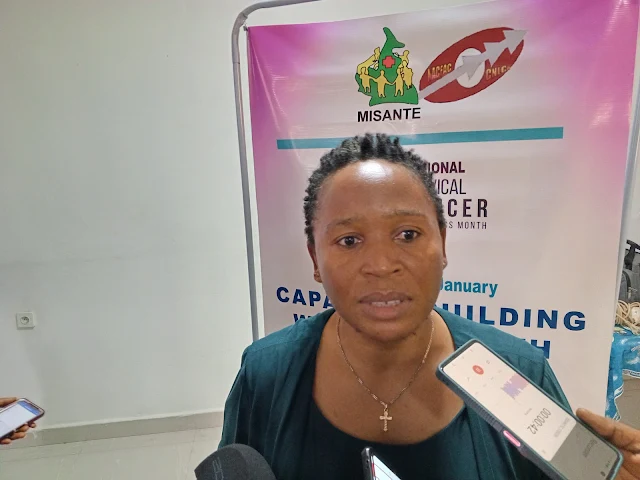CBCHS,H@H Partner With CAMASEJ Bamenda Against Cervical Cancer Amidst Alarming Figures
 |
| Workshop Resource Persons, And Participants In Family Photo |
By Raymond Dingana
Members of the Bamenda chapter of the Cameroon Association of English Speaking Journalists (CAMASEJ-B) have joined forces with the Cameroon Baptist Convention Health Services CBCHS, and Humanity at Heart International H@H to eliminate Cervical Cancer amidst frightening statistics.
Cervical Cancer is ranked fourth most common form of cancer and fourth leading cause of death amongst women in the world.
It is caused by the Human Papillomavirus (HPV), a common sexual transmissible infection, and two types exist, the Low and High Risk types. The high risk type is the one that causes several types of cancer including cervical cancer.
In Cameroon, it is ranked second and most common and leading cause of female cancer deaths in the country with 1,878 deaths of the 2,770 diagnosed cases in 2020.
However, the good news is that cervical cancer is treatable if captured early enough, advocates for it's elimination told journalists in Bamenda on Friday January 12, during a one day capacity building workshop with members of the Cameroon Association of English Speaking Journalists CAMASEJ Bamenda and community health workers.
The media men and women also joined the World Health Organization WHO's 90-70-90 cervical cancer elimination target by 2030.
 |
| Resource Person, Tata Mayaah Eveline |
The training workshop organized by the CBCHS, and Humanity at Heart International in partnership with CAMASEJ Bamenda was part of activities to mark the month of January recognized globally as cervical cancer awareness month.
Ngala Calvin, Assistant Supervisor of the Women's Program of the CBCHS revealed at the workshop that the reason for the high number of infected cases and deaths has been blamed on the lack of trained personnel in the field of Cervical Cancer screening, limited diagnostic and treatment facilities, wait for symptoms, and lack of knowledge on patient navigation.
 |
| Executive Director, Humanity at Heart International, Tata Mayaah Eveline |
According to the Executive Director, Humanity at Heart International, Tata Mayaah Eveline, early diagnosis is key.
" Cervical Cancer is the only cancer that can be treated at 100% if discovered early,"
Mayaah said adding that
"some infected women remain ignorant and only go to the hospital when they start feeling pains."
To curb rising numbers of cervical cancer cases and deaths in the country, Mayaah said much is needed from the media given the role they play in community development.
"We expect the journalists to amplify the call for children both girls and boys to be vaccinated, and encourage other women to go for early screening and not wait when they start feeling pain. Cervical Cancer can be treated if it's discovered on time. We are encouraging them to let the world know that Cervical Cancer is the first cancer that we know what is causing it ,and what can be done to treat it,"
explained Mayaa.
Journalists Pledged To Play Role
Journalists who attended the workshop said they have gained enough knowledge which they will replicate to their audience through their various platforms to help eradicate the virus.
Sah Terence Animbom of the Sun Newspaper told drayinfos.com that he will in the days ahead be using his publications and interactions to advocate and sensitize the public on all what they need to know about cervical cancer, importance of early diagnosis and treatment, not leaving out the importance of vaccinating young girls and boys.
To Clenice Ayumbom working with CRTV Bamenda, she will also be letting the population to know that there is a vaccine for children between the ages of 9 and 14 years, and also to encourage her peers to go for screening.
 |
| Workshop Participants |
Cervical Cancer prevention is done in two folds, the Primary prevention basically through vaccination, and secondary prevention through screening and treatment.
"The most recommended test is the HPV DNA testing as indicated by WHO. It's simple to collect the specimen as the woman just need to insert a brush given to her by the hospital in to her vagina to collect it. It's taken to the hospital for the test to be run and if it's positive, then she will go in for a second test called the Triage test, if it's negative, then she has a two years appointment,"
said Assistant Professor of Reproductive Health, Dr. Manga Simon.
 |
| Assistant Professor of Reproductive Health, Dr. Manga Simon |
To stay safe from the virus, journalists were called opon to also educate the people on preventive measures such as the use of condoms, vaccinate girls and boys age 9-14 years of age.
They were also enjoined to inform the population that they should abstain or delay sexual activities for adults, faithfulness in one partner for those in relationships, among others.






Comments